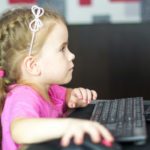 The Covid pandemic has thrown up numerous fascinating social experiments, and none more so than the transition towards e-learning for students around the world after schools shut to try and limit the spread of the virus. New research from the University of Pennsylvania explores how this move affected the students socially.
The Covid pandemic has thrown up numerous fascinating social experiments, and none more so than the transition towards e-learning for students around the world after schools shut to try and limit the spread of the virus. New research from the University of Pennsylvania explores how this move affected the students socially.
“Many news stories have reported on individual stories of teenagers who have suffered from anxiety, depression, and other mental health challenges during the pandemic,” the researchers say. “This study gives some of the first empirical evidence of how learning remotely has affected adolescent well-being.”
Thriving gap
While discussions around the educational attainment gap between students as remote learning has dominated, the research finds that a similar gap exists in terms of the social and emotional skills students have. The study found that those students who were attending school remotely suffered across all measures compared to their peers who attended in person. This “thriving gap” was consistent across race, gender, and socioeconomic status.
“Notably, the thriving gap was larger among students in 10th through 12th grades than it was among ninth graders,” the researchers say.
The research builds on previous work that involved the creation of the Character Lab Student Thriving Index, which was an anonymous survey that assessed the social, emotional, and academic experience of students immediately prior to the pandemic forcing schools to shut down.
After two-thirds of students in the sample began attending school remotely, with the remaining third attending in person, a follow-up survey was conducted in October 2020 to see how things had changed. The results reveal the scale of the harm experienced by students and underline how we should not limit our focus purely to academic harm.
“As policymakers gear up for national tutoring and remediation programs–which we agree are urgent priorities–we must recognize that our nation’s students are not just lagging as performers, they are suffering as people,” they continue. “Meeting their intrinsic psychological needs–for social connection, for positive emotion, and authentic intellectual engagement–is a challenge that cannot wait.”